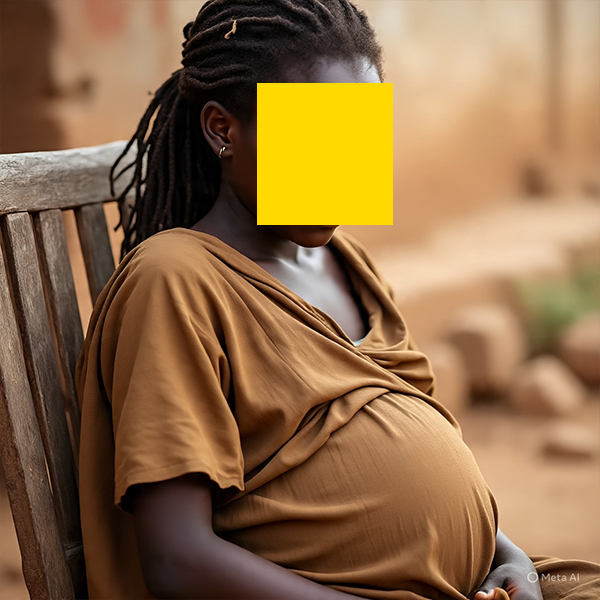Last week, Ghana’s Parliament once again turned its attention to an issue that has haunted the country for decades: _teenage pregnancy. One would expect that with all the national discourse, classroom teachings, and campaigns over the years, this problem would be on the decline. But the reality on the ground paints a far more disturbing picture.
Right from Basic 1, we’ve been taught the dangers of teenage pregnancy in Social Studies, Religious and Moral Education (RME), and even in community durbars. So the question is:
What exactly are we getting wrong?
Why does the cycle persist?
Is it that teaching the topic in schools isn’t enough?
Are the students not listening or are we failing to communicate effectively?
Is this the result of poor parental control? Lack of sex education? Cultural silence?
Could it simply be ignorance or even worse, a conscious choice? Hmm
These are the questions that ran through my mind this past week, and I believe many Ghanaians are asking the same.
*
The Numbers We Can’t Ignore
*Teenage pregnancy is not just a social issue it’s a national emergency that affects education, healthcare, the economy, and intergenerational poverty. According to the 2022 Ghana Demographic and Health Survey:
• 15% of girls aged 15–19 had been pregnant.
• Over 100,000 cases of teenage pregnancy were recorded in Ghana between 2020 and 2021, according to Ghana Health Service records.
• In rural areas, the rate is as high as 19.5%, compared to 10.6% in urban centres.
The situation is worse in regions like Bono, Bono East, Central, and Eastern where teenage pregnancy has derailed the future of thousands of schoolgirls.
Where Are We Failing?
It is time we admit that something in our approach is fundamentally flawed. The system isn’t working. After decades of education campaigns, we are still recording five-figure teenage pregnancy cases annually. *So again we ask:
*• What are we not doing right?
• Who must be held accountable?
• Are we throwing money at a problem without understanding the root cause?
The recent heartbreaking account shared by Hon. Ernestina Ofori Dankyi, MP for Agona West, during parliamentary discussions, sheds light on the harsh reality many girls face. She recounted the story of a girl who became pregnant simply because she couldn’t afford sanitary pads and was advised to find a boyfriend who could provide her basic needs. This isn’t fiction, it’s a real story. And it represents thousands more.
The Two Faces of the Crisis
This growing crisis isn’t only about peer pressure and ignorance. It has two equally disturbing dimensions:
1. Exploitation and Vulnerability
In many cases, young girls are lured or coerced into relationships by men including teachers who take advantage of their economic hardship. This is not just immoral, it’s criminal.
2. Seduction and Desperation
There is also a less discussed dimension: girls who, knowingly or unknowingly, present themselves in ways that attract the wrong attention, sometimes in search of validation or material support. While this doesn’t justify abuse, it adds complexity to the issue.
Are we equipping our girls to understand their self-worth?
Are we enforcing standards among teachers and school officials who are supposed to be protectors, not predators?
Have We Done Enough? Or Just Talked Enough?
Ghana has spent years investing in awareness campaigns, training teachers, creating school clubs, and distributing materials. But if we were to compare these investments to the actual impact, would we be proud of the results?
Some of these questions demand answers not just at the top, but across all sectors:
• Has the Ministry of Education made sexuality education a priority beyond textbooks?
• Is the Ghana Education Service enforcing sanctions against predatory staff?
• What practical support do girls in vulnerable communities receive from the Ministry of Gender and Social Protection?
• Is the Ministry of Health adequately funding adolescent health programs, especially in rural areas?
What Must Be Done?
This is a national failure, but not one without solutions. It is time for a national task force or committee to:
• Conduct an honest audit of the past 20 years of anti-teenage pregnancy campaigns.
• Engage multiple stakeholders educators, parents, health workers, faith leaders, and the youth themselves.
• Visit countries like Rwanda, South Africa, and Kenya to learn about integrated approaches that have helped reduce adolescent pregnancies.
• Develop enforceable guidelines with proper funding for monitoring, evaluation, and real-time support for vulnerable girls.
A Call to Action
This is not the time for lip service or blame games. It’s time for national sincerity. If we truly value our girls, then we must build a system that does more than inform—a system that protects, empowers, and uplifts.
Let this article serve as a wake-up call.
Let these questions spark discussion.
Let Parliament not only talk but act.
Let parents, educators, faith groups, and policymakers commit to real change.
Because if we do not rise to protect the girl child, we are not only failing them we are failing the very future of Ghana.
By Isaac K. Odjidja – Women Empowerment Advocate





